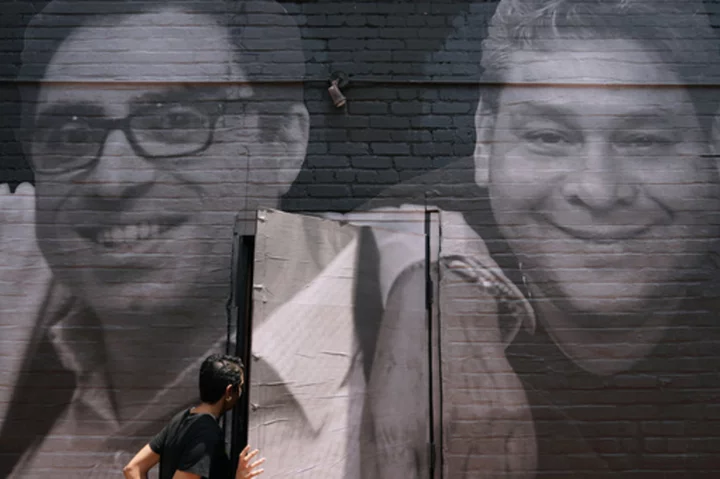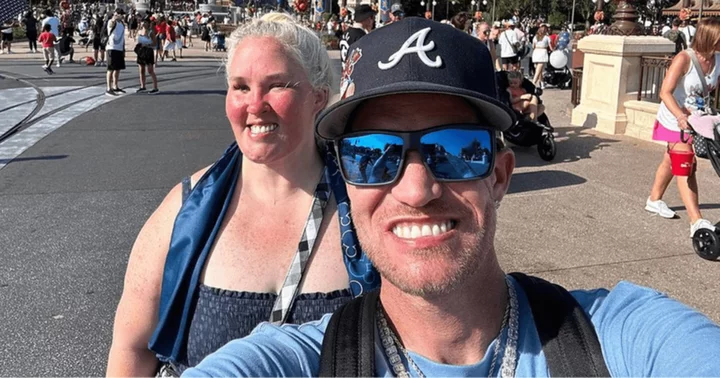When the first generations of social media natives are old and gray, they will bounce their grandchildren on their knee and tell them about the old days when Facebook was just for college kids and Twitter wasn't a place for world-altering political discourse. As their rheumy gazes search the distant past, they'll recall another titan of that lawless age.
"Then there was Tumblr," they'll wheeze. "Man, that place was weird."
Though the blogging platform is still active, Tumblr's unquestionable heyday passed in the mid-2010s. It was -- and still is -- hailed as a crucible of nerd-dom, where young people gather to trade memes, pop culture observations, poems, musings, fan fiction, art, and absurdist jokes to satisfy even the most niche communities. Years of Tumblr discourse have helped shape current structures of entertainment fandoms, social justice language, queer subcultures and all manner of special interests one might see at a comic book convention or Marvel movie premiere.
However, in 2014, its denizens learned a hard lesson when some forward-thinking users thought to gather this amorphous mass of creativity and recreate it in real life.
The result was DashCon, an attempt to bring together Tumblr users from different interests and fandoms for a single event. The idea was similar to the already-popular VidCon, which focuses on YouTube celebrities, or any number of fan conventions around the world that have been going strong for decades.
DashCon would not reach such great heights. It was a legendary failure, plagued by low attendance and mismanagement, summed up in one iconic image of a single, sad child's ball pit on a hotel convention room floor.
For all its (somewhat hilarious) failures, DashCon immediately became a core parable of our social media lore. It taught us how difficult it is to translate the social media experience into the real world, and that sometimes, even with the best intentions, what happens online should just stay there.
The teenager who started it all
To say DashCon was a failure is a simple fact. Whose failure it was, exactly, is a thornier question. The idea can be traced back to Lochlan O'Neil who was only 17 at the time DashCon took place.
Like so many other Tumblr users, O'Neil was just a nerdy teenager with cool interests looking for other people like her. She started using Tumblr in 2012, and it took her a while to really figure out what the platform was for.
"I saw one of my neighbor's accounts where she would just post pictures of hipster hairstyles and One Direction members, and I thought 'What is this even for?' But my friend assured me it was cool, that you could blog about whatever you wanted," O'Neil told CNN.
O'Neil, who is now a costume designer and also works at an exotic animal sanctuary, always had an interest in small animal husbandry.
"I started on Tumblr writing traditional blogs about mouse genetics," she said. "My blog was call 'Mice are Nice.'"
O'Neil's Tumblr experience became markedly better once she sussed out what kinds of interests were big on the platform. She had always been a fan of Harry Potter, and had started getting into cosplay, anime and the Avengers -- all extremely popular subjects among Tumblr users.
Over time, she even met one of her best friends on the platform after searching content about her hometown.
"I was always kind of an outsider. I didn't really have the ability to connect with people and I didn't know why," she said. "But when I met my best friend, I was like, well, there must be more people like me on Tumblr. There must be more people like her on Tumblr."
She noticed this pattern a lot: people forming strong bonds with virtual strangers online over things that really mattered to them, things that they didn't have a network for in their everyday lives.
"I saw these posts and I thought, 'What if there was a Tumblr convention? What if I made a Tumblr convention? And then all of you could also have friends?'"
Rallying the troops
O'Neil started a Tumblr blog called Tumbl-Con, a launch pad for what would eventually become DashCon, named for a Tumblr user's main page which is called a dashboard.
Initially, O'Neil was enthusiastic about all of the support and attention. She knew how to get the message out to fellow Tumblr users, and it wasn't long before people were offering to be on committees for different fandoms, like the British drama series "Sherlock" and the CW series "Supernatural."
"It's important to note that, before this, I had only been to two conventions," she said. "One was a small anime convention. The other was a rabbit breeders convention in Indiana."
"So that's what I was imagining when I was imagining this event. Lots of booths for different interests, fun activities, all of that. I was a teenager. Maybe I was stupid, but when people said they were going to help out or attend I trusted them."
In the middle of the planning process, O'Neil had to step away from Tumblr for a few weeks while her family made a cross-country move. When she came back, the idea had ballooned without her -- there was a dedicated LLC involved; plans had been made for a date and location. What had started as her idea had swiftly outgrown the powers of a single teenager.
The con goes down
DashCon 2014 took place July 11 through 13 at the Renaissance Schaumburg Convention Center Hotel in Schaumburg, Illinois. Even though the finances and logistics of the event were being managed by others, O'Neil still headed up marketing efforts, and was on hand when the convention got underway.
The ways in which DashCon fell apart are well documented by internet historians, and were fodder for pop culture blogs for weeks after the fact. Reported attendance was only in the hundreds, a mere fraction of the estimated crowd. Special guests and vendors either canceled or were not properly secured in the first place. At one point, O'Neil said she and others were locked out of her hotel room, along with other DashCon guests, because the hotel bills hadn't been paid by the event's organizers.
"It was terrifying. I was hungry and scared," O'Neil recalled. At one point on the second day of the event, organizers gave O'Neil a paper bag and asked her to approach the con's remaining guests to ask for donations to make up the roughly $17,000 they said they needed to keep the con afloat.
And then, there was the issue of the ball pit.
One of O'Neil's original ideas, when hope was high and life worth living, was to have a giant ball pit at the event. Everyone loves a ball pit, and it felt right for DashCon's vibe. ("Ball pits are also great enrichment for ferrets," she added.) The con's organizers assured her she would get her wish.
As the underripe fruit of her Tumblr imagination withered around her, improperly tended by people beyond her age and experience, the confused 17-year-old sought out that one last consolation. It was a sad affair: A single, shallow blue kiddie pool with colorful balls rolling over its lumpy edges.
"I thought, 'At least I have my ball pit." So I went to a Taco Bell, I got some chips and nacho cheese. I came back and I found the ball pit, and it did not feel real," O'Neil said.
"You know how sometimes you feel like you're in a dream? It was this, but it was horrifying. A nightmare. And I just kind of sat in it and ate my cheese."
More than the larger issues of mismanagement, more than the disappointed few hundred Tumblr users who showed up to the con, and the thousands more who watched the event break down in real time online, the ball pit of dissociation became the enduring emblem of DashCon: something fun and full of promise, now deflated and alone on the floor of a convention room in Schaumberg, Illinois.
However, it wasn't all bad. If you're nerdy, or really into animal husbandry, or write 100,000-word romantic epics about Harry Potter in your free time, you're bound to feel a little deflated and alone sometimes. You learn to not let it diminish the joy of your pursuits. O'Neil said everyone she actually met at the convention was lovely and friendly and had the kind of spirit that inspired her to conceive of DashCon in the first place.
"I always felt like Tumblr was a place where I could really be myself," O'Neil said. "There are people that are always posting weird things. But then it makes you feel like maybe you too can be a little weird."
The big lessons
The failure of Dashcon wasn't all memes and jokes about ball pits. There were serious questions in the aftermath about financial issues, and O'Neil said she was the target of pointed criticism from Tumblr users. She said she even received death threats over her perceived role in the event.
"I think first of all, this was the first kind of convention of its kind. It was one of the first times people on social media, as far as I know, decided to have a convention just for themselves, by themselves. When we began, nobody was professional. Nobody knew what they were doing. They were just enthusiastic and excited."
"I was also literally a minor," she added.
O'Neil doesn't use Tumblr nearly as often anymore. Tumblr's influence peaked around 2014. Around the same time, it underwent a series of ownership changes, and the platform never regained its initial level of social relevance.
Still, for better or worse, DashCon and O'Neil's involvement in it are forever cemented in the annals of internet culture. There's the worse, of course: O'Neil, now 26, is still wary about revealing her identity and location when she attends cosplay conventions or speaks on panels. She learned, in short and traumatizing order, how big of a gap there is between a dream and a functioning reality.
The better is, well, better. O'Neil is still friends with people she met at the event. She said people still send her cosplays of the infamous ball pit, almost 10 years later. It's just another sign of how deep the event has etched itself in peoples' memories; not in a place of derision, but in a place of absurd, almost disbelieving fondness.
"It was a terrible convention," she said. "But it wasn't the first terrible convention, and it won't be the last. As we move forward in the future, people are always going to have big, creative ideas. They're going to get excited, and they may not know their own capacity. And when that happens, others are going to say, 'Don't you remember DashCon?'"









